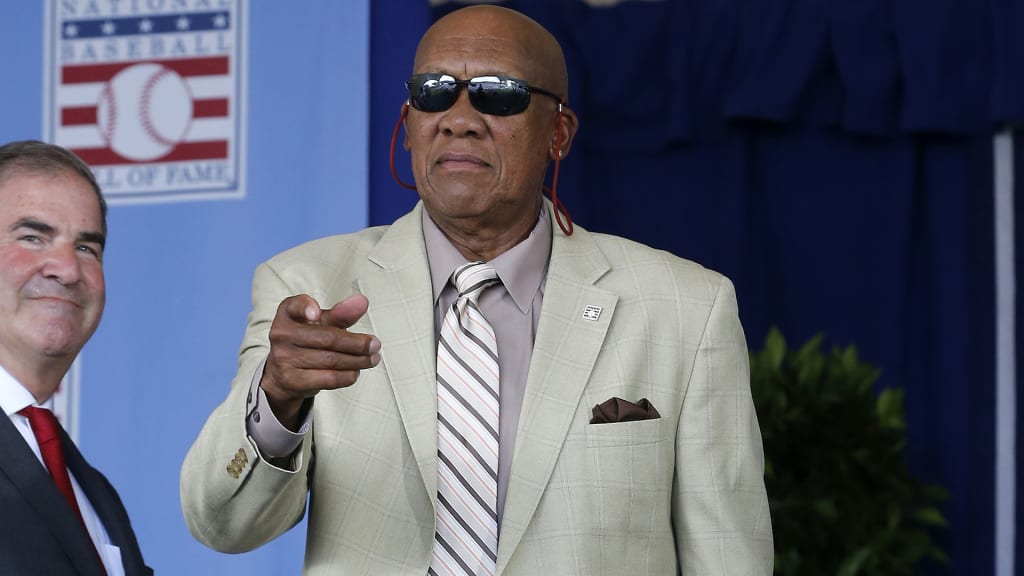
CHICAGO -- Fergie Jenkins let out an amused laugh in a recent phone conversation. The Hall of Fame pitcher was recounting how some Cubs fans recognized him recently while he walked around Chicago, even though he was wearing a mask.
That comes with the territory for a franchise icon like Jenkins. He stands tall as one of the great pitchers ever to take the mound for the Cubs, and he’ll soon have a statue in his honor outside Wrigley Field. Jenkins made multiple All-Star teams, won a Cy Young Award and was part of the '60s teams that turned games into events on the North Side.
"People have had a chance to meet me and see me perform," Jenkins said. "But they don't really know the real Ferguson Jenkins."
That comment cuts to the heart of a documentary, "Glory and Grief: The Ferguson Jenkins Story," that is set to debut on Wednesday on Marquee Sports Network, following postgame coverage from the Cubs' road game against the Brewers.
The hour-long film details Jenkins' family background and accomplishments on a baseball field, but it also includes a look into the list of tragedies and loss he has experienced throughout his life. Now 78 years old, Jenkins said he allowed tears to flow again as he watched the final version of the documentary.
"It was just grabbing me again," said Jenkins, who felt the film offered another chance at personal healing. "It could've been, in some respect, because I've had some quiet times where I've just thought about people that have been an influence in my life. And all of a sudden, I've lost them."
The version of Jenkins with which Cubs fans are most familiar is the workhorse starting pitcher who boasts the most strikeouts (2,038) and starts (347) in franchise history. Over a 19-year career -- also including stints with the Phillies, Red Sox and Rangers -- the right-hander won 284 games, struck out 3,192 batters and had a 3.34 ERA in more than 4,500 innings.
Jenkins finished in the top three in Cy Young Award voting five times, winning the National League's top pitching honor in 1971 (24 wins, 2.77 ERA, 30 complete games, 263 strikeouts and 325 innings). He was a three-time All-Star, seven-time 20-game winner (six in a row from '67-72 with Chicago) and the first Canadian-born player inducted into the Hall of Fame.
There is so much more to Jenkins than those achievements, though.
The documentary features interviews with Jenkins' four children, personal friends and former teammates, and it also includes rare footage from the MLB archives. Altogether, it tells the story of Jenkins' rise to stardom and a look into the loss of his mother, his second wife, a fiancée and young daughter.
Jenkins' mother, Delores, lost her eyesight during the pregnancy with Jenkins, her only child. When she had the chance to attend his games with the Cubs, she would have a transistor radio with her in the stands. She lost a battle with cancer in 1970, and Jenkins won his 20th game of that season shortly after her funeral.
His second wife, Mary Anne, died due to complications with pneumonia in January of '91 while in the hospital, following a serious car accident the previous December. Jenkins was away at the time of her passing, while attending the press conference for his election into baseball's Hall of Fame.
Then in December of 1992, Jenkins' fiancée took her own life in a murder-suicide that also claimed the life of his 3-year-old daughter, Samantha.
"He never did say, 'Why me?'" former Cubs outfielder Billy Williams said in the documentary. "He never did say that. His mother passed away, he'd go out and pitch. He put it aside. Wife passed away. Put it aside. Go to the next level. He had ways of being strong."
Jenkins said he had dark days, but he found ways to move forward.
"Everybody has a test in their life. And I've been tested a few times," Jenkins said. "I could've broken up lots of things after the situations that have happened. I just try to calm myself, think twice, don't do anything irrational or crazy that's going to, in the long run, hurt me or my family. I've learned to cope with it."
These days, Jenkins lives in Texas and has his family to lean on. He is active on social media, interacting with fans and reacting to what is going on with the Cubs. Back in January, he even met up with a fan in Texas who was looking for someone to play catch with and talk pitching.
Jenkins is constantly looking for ways to pass positivity along to others.
"That's the biggest thing," Jenkins said. "I think that's good. I think that's good for baseball and especially good for me as an ex-player."
And Jenkins hopes the documentary on his life can not only inform viewers about his story, but perhaps also be a source of inspiration for anyone facing struggles in their own life.
"Everybody has trials," Jenkins said. "I'm like everyone else. Everyone has a chance to cry. And I've done it quite a few times."
